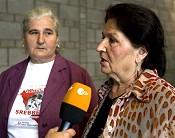VOA标准英语2008年-Srebrenica Massacre Victims' Families File Dutc
搜索关注在线英语听力室公众号:tingroom,领取免费英语资料大礼包。
(单词翻译)
By Lauren Comiteau
Amsterdam
18 June 2008
Relatives of the victims of the 1995 Srebrenica massacre1 in Bosnia-Herzegovina have asked a Dutch civil court to wave U.N. immunity2 and allow them to seek damages for their loss. About 8,000 Muslims were murdered by Serb forces 13 years ago after they overran what was supposed to be a U.N. safe area protected by Dutch peacekeepers. For VOA, Lauren Comiteau reports from Amsterdam.
 |
| Bosnian members of Mothers of Srebrenica organization speak to the press during session at court in The Hague, 18 Jun 2008 |
A massive civil suit was brought by about 6,000 family members of the victims. They say Dutch peacekeepers, working under the United Nations, were responsible for the protection of their loved ones, who were unarmed and innocent.
About 8,000 Muslim men and boys were executed during one week in the summer of 1995.
The United Nations claims immunity and refuses to take part in the case. It is a position supported by the Dutch government, which argues that U.N. immunity is crucial to ensuring that peacekeepers can do their jobs.
The Netherlands places the blame solely3 on the Bosnian Serbs, whose leaders Radovan Karadzic and General Ratko Mladic are still on the run from U.N. prosecutors4 who have charged them with genocide.
But a lawyer for the victims group Mothers of Srebrenica, Semir Guzin, says that by failing to live up to their mandate5 and prevent the murders, the United Nations and the Dutch are responsible for genocide.
"We have a lot of evidences that the Dutch government, at a very critical moment, took responsibility to issue direct orders to their soldiers on the ground. And the main goal of those orders was to protect the lives of their soldiers, not of the civilians6 in the safe area," Guzin said.
Victims' families have made their cases to other courts in The Hague. Both the Yugoslav War Crimes Tribunal that holds individuals criminally responsible and the International Court of Justice that rules on state responsibility, have established the crimes at Srebrenica as genocide.
But in this civil suit, the second such case to be heard in a Dutch court this week, judges must rule if the United Nations can be sued in national courts, and on the culpability7 of the Dutch state. It is a decision no doubt being watched by other nations whose troops are serving in peacekeeping missions throughout the world.
In 2002, the Dutch government collapsed8 after a report concluded it had sent its unprepared troops on an impossible mission. But the state denied liability for the murders, ruling out monetary9 compensation at the time.
 收听单词发音
收听单词发音 




